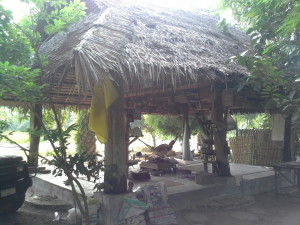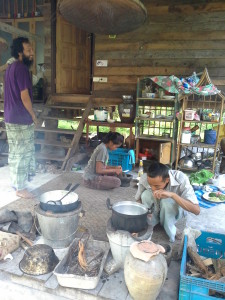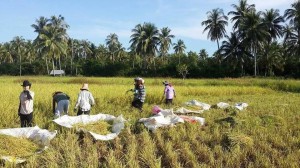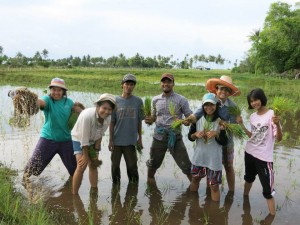The path to a family-based liberal community
in Cha-uat, Nakorn Sri Tammarat Province
Project number: 1601MLTV
Volunteer type: Medium and Long Term (two months minimum)
Max Number of Volunteers: 4
Available application period: all year round
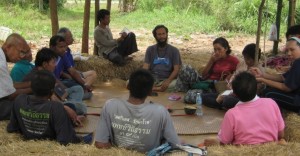
SHORT DESCRIPTION
A group of a few families with liberal dreams decided to start alternative education for their children and the interested members of their villages. They would like to welcome volunteers to help them to organize education activities and will include them as a part of their family and life style toward harmonious relationship between people and their environment. They try to free themselves from any kind of slavery from the mind to the body and the entire society. They want to become a new kind of responsible community based on a liberal way of life through spiritual work and active daily life.
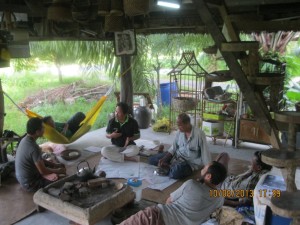
HISTORY and REASONS OF THE PROJECT
All the members of this community, living in a few neighborhood villages are active in the social life of their area and want to take full responsibility of their way of life. They first met at the Southern center for Buddhist alternative medicine (Mor Keaw) and decided to join together for deeper reflections on how to improve this society. They have good knowledge about alternative education (already practicing home schooling), traditional health, agriculture, herbs… They want to take concrete actions with meaningful results.
The important domains we try to be free from in Withee Tai are: education, economy, society, health. It should be starting by ourselves, then the family, the community (natural or chosen), the country, the world. We want to change the world by acting locally, not only dream. Everyone is responsible.
So how can we bring the volunteers to the right direction so she/he can start the improvement for him/herself? How to make the change from a society where you work for a reward (having a good score, having a salary) to an open space where you work by free will, by voluntary spirit? We need to learn together and for this we need each one to open ourselves, break the ice between people, realize our common desire to preserve the world and rely on our volunteer spirit. We should have enough attention to learn from observing ourselves at any time. We shouldn’t try to change others (only if asked for help).
About 8 families will be the core of this community based in 5 villages. The main center is the house of Crue Liam where a clay house has been built to welcome volunteers. Volunteers will follow the rhythm of life of these families.
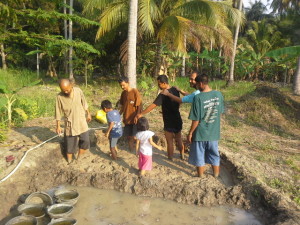
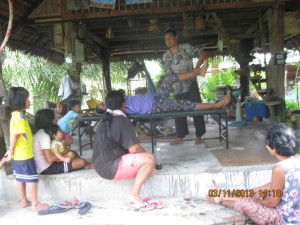
AIMS of the PROJECT
1- Improve the quality of human way of life
2- Start a new kind of community exempt of slavery, on the base of family and with a healthy environment.
Participants would feel attached with:
– freedom in following their dreams
– good relationships between people
– unity and solidarity as well as preserving diversity
The seven agreements of Withee Tai community:
– Find our common ground within our differences.
– Learn from others by observing inside ourselves.
– Say what you do and do what you say.
– Everything is based on the relationship of brotherhood.
– Develop heart of ownership.
– Positive thinking. (Get free from judging others).
– Do not take side part from one or another when a conflict occurs.
WORK AND ACTIVITIES
At Withee Tai, volunteers practice healthy activities for body, mind and soul: morning walk, yoga, discussion-evaluation in evening, prayer before meals, health camp…
For the daily routine, we decide it together with the hosts and the team of volunteers. It includes collecting food, cooking and cleaning of course. For the rest, it is not fixed and depends of the team and time of the year. Some days will be about agriculture, some about activities with kids (joining Withee Tai learning center), and some for construction or garbage management. There are easily changes when people come to visit, the hosts are invited to meetings, other activities; you may join or stay home to do something on your own… The quantity of work would depend on you; also if you find some project of your own, everything is possible. And to be frankly, when you chose and enjoy what you are doing, it’s no reason to call it work anymore, it’s just activities in the day. We also organize dialogue with the community members about learning process of participants, evaluations and future plans, at least once a month.
WITHEE TAI COMMUNITY LEARNING CENTER
Since November 2016, Withee Tai has been officially registered as a community based learning center. There are about 25 of these centers in Thailand. They are free to organize their way of education and recognized at the same time. There are now over 10 kids registered and more are interested, but everyone around is also part of the learning process. We give equal importance to everyone; there are no actual teachers but 3 equal groups for decisions and preparing adapted program to each child: children, parents and facilitators (mentors).
The aim of the learning center is to improve the life quality, improve:
1- our soul 2- our environment 3- our professional skills (find our way)
Being free means for us being happy to live together.
Children will learn from joining and practice concrete activities some will be for everyone like yearly meeting, art camp, thanks rice and water festival, health and family camp, or walking trips. Other will be optional depending of the child interest. It includes yoga, healthy cooking, gardening and rice planting, languages learning in everyday life with volunteers, economic project, local cultural event, international family camp, making natural dam, clay house building, social enterprise (business) project, local cultural events… and any new possible activity proposed by kids or volunteers around can be included.
The only real obligation for kids to join this learning center; and it could be interesting for volunteer to do so; is to take time everyday (at least regularly) to think about these 3 questions: What did I do (today)? What did I learn? How did I feel? and to find a way to record it, drawing, writing,…
This is for a double reason, first to be able to learn effectively about ourselves and secondly to be able to explain and show to people outside our learning process. Indeed, not sending our kids to a regular school is usually not well understood by people around. There is also a possibility for each kid to be back to a regular school and the learning center offers the equivalence with a proper system of step to reach.
- For those interested, you may assist to organize health camp together with the Southern center for Buddhist alternative medicine (MorKeaw) .
(http://morkeawninepills.blogspot.com/2013/10/balancing-of-hot-and-clod-elements-in.html)
FOOD and ACCOMODATION
Volunteers’ bedroom will be in the clay house, you may need to share your room. There will be simple mattress, pillow and mosquito net. You will need to bring sleeping bag .Volunteer will be part of the family who will take care of them for everything including food, security and transport. You will join daily tasks for collecting food and cooking. Local people eat rice (or noodles) 2 or 3 times a day with side dishes like curries, omelets, local leaves and vegetables and quite many fruits depending of the season..
OTHER PRACTICAL INFORMATION
Cha Uat is a district of Nakorn Sri Tammarat province situated half way between the Bantad mountain range and the South Chinese sea. It has wetland forest, canals, palm and rubber plantations, rice fields and other vegetable garden. Locals make crafts from palm leaves. They have also traditional South Thai dance (Manora) and Shadow puppets theater (Nang Talung). Ban Ta Saton, the village of Crue Liam is few kilometers from Cha Uat small town where you can find hospital, market, shops, banks, internet cafes and the train station (Bangkok- Hatyai line).
The most rain season is usually from October to December. There are a lot of mosquitoes because of the swamp around.
Laundry: expect to hand-wash your clothes
Water supply and electricity: available
Internet/phone access: There is WIFI open at certain time of the day. Volunteers are requested to use in private areas mainly and restrain themselves when with kids and people.
Hat Yai, the main city of South Thailand (close to DaLaa office) is 3 hours by train from Cha Uat.
Clothes worn in the village: You will be living in an area with elderly people and children around so it is appropriate that you dress modestly, for example no short skirts or shorts too far above the knees. Also women should wear tops that cover your shoulders.
REQUIREMENTS
The volunteers should be ready to stay in a remote area, to adapt to the local conditions with only basic facilities and with few people able to speak in English. Volunteers should be able to handle spontaneous working environment and constant changes in the plans. The mentality and way of thinking is very different from the western world. There will have often activities with the children. To have responsibility for yourself, the kids and full involvement in community matters is a must.
**For ones who plan to travel in Thailand/Asia besides this voluntary work, having it done before or after the project would be advisable. We hope that volunteers will fully spend their stay in the project without asking for a long holiday break amid the project period. This would cause uncertainty in running activities.

